Nation Surname Ancestry ResultsOur indexes 1000-1999 include entries for the spelling 'nation'. In the period you have requested, we have the following 134 records (displaying 101 to 110): Single Surname Subscription | | | Buying all 134 results of this search individually would cost £770.00. But you can have free access to all 134 records for a year, to view, to save and print, for £100. Save £670.00. More... |
These sample scans are from the original record. You will get scans of the full pages or articles where the surname you searched for has been found. Your web browser may prevent the sample windows from opening; in this case please change your browser settings to allow pop-up windows from this site. Associates of the Institute of Bankers
(1904)
The Journal of the Institute of Bankers for 1904 includes a list of Fellows (from which this scan is taken: an asterisk indicates a Life Fellow), of Associates (an asterisk indicates a Life Associate, and a dagger a holder of the certificate of the institute), and of Ordinary Members; there are also results of the institute's final examinations held from 11 to 13 April, in which the successful candidates are listed alphabetically by surname and full christian name(s), with the name and address of their bank (not their personal addresses). These final examinations entitled the successful candidates to the Certificate of the Institute of Bankers; those who obtained distinctions are so indicated in the lists (an asterisk for Commercial Law, dagger for Arithmetic and Algebra, double dagger for Practical Banking, double s for Commercial Geography and History, and double vertical line for Political Economy). There was also an examination taken after the Gilbart Lectures, with successful candidates being awarded money prizes, or certificates of distinction, or honour, or merit, and similar lists of these awards were also printed in the journal.NATION. Cost: £6.00.  | Sample scan, click to enlarge

|  Queen's South Africa Medal: Royal Field Artillery: 7th Battery
(1901-1905) Queen's South Africa Medal: Royal Field Artillery: 7th Battery
(1901-1905)
The nominal roll for the Queen Victoria's South Africa Medal - awarded (after her death, in the event) to all who had served honourably in the various campaigns in the Boer War - was compiled from these returns from the individual units. Two sets of form were completed. The main one, as in the sample scan, dates from 1901 and gives regimental number, rank, and full name (surname first), followed by a series of columns relating to different actions - Belmont, Modder River, Paardeberg, Dreifontein, Wepener, Johannesburg, Diamond Hill, Belfast, Wittebergen, Defence of Kimberley, Relief of Kimberley, Defence of Mafeking, Relief of Mafeking, Cape Colony, Orange Free State, Transvaal, Rhodesia, Talana, Elandslaagte, Tugela Heights, Defence of Ladysmith, Relief of Ladysmith, Laing's Nek, and Natal; each entitled the man to a separate clasp to the medal, and a tick or a Yes in the appropriate column indicates the man's actual physical presence in that battle. A final column for remarks is important in those cases where the man was no longer in the unit, by removal, death or desertion. The second form that sometimes occurs was returned in 1905, and covers men entitled to the Second South African War Medal and Clasps. It lists men by number, rank and name, checks whether they had claimed the Queen's South Africa Medal, and then enquires as to their suitability as to three Colony Clasps, which could be awarded for service in the Cape, Orange Free, or Transvaal; whether entitled to Date Clasps (South Africa 1901 and South Africa 1902); whether also entitled to the King's South Africa Medal; any other corps in which served in South Africa; and remarks (such as becoming non-effective, forfeiture, &c.) WO 100/140NATION. Cost: £8.00.  | Sample scan, click to enlarge

| Indian Members of the Order of the Bath
(1905)
The India List and India Office List was compiled from official records by direction of the Secretary of State for India in Council, and published by the India Office annually. It covers civil servants and military except for officers drawing substantive pay of less than 500 rupees a month. Names shown in italics are those of officers in foreign service, supernumerary, seconded or employed outside their own departments. This list covers the officers of His Majesty's Indian Services members of the Most Honorable Order of the Bath, with the dates of their appointments - Military Knights Grand Cross (G. C. B.); Civil Knights Grand Cross (G. C. B.); Military Knights Commanders (K. C. B.); Civil Knights Commanders (K. C. B.); Military Companions (C. B.); and Civil Companions (C. B.).NATION. Cost: £4.00.  | Sample scan, click to enlarge

| Members of music institutions
(1905)
The calendar of the Trinity College of Music, London, for 1905-1906 includes a section listing institutions enrolled in union with the college (throughout the world) with names of secretaries; centres authorised by the board for the holding of local examinations in music, with names of secretaries; and the local centre committees, with names of chairmen, secretaries, and members of their boards.NATION. Cost: £8.00.  | Sample scan, click to enlarge

| Civil Servants and Office Holders
(1913)
The Imperial Calendar gives lists of officials and office-holders throughout England, Wales, Scotland and Ireland
NATION. Cost: £4.00.  | Sample scan, click to enlarge
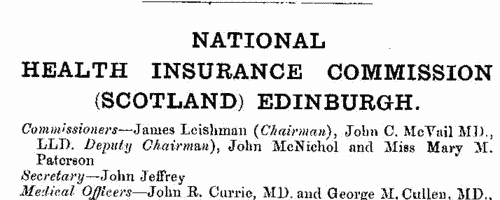
| War Services of British Army Officers
(1915)
Hart's Annual Army List, Special Reserve List and Territorial Force List for 1915 includes this section entitled 'War Services of the Officers of the Active List', covering not only serving officers of the regular army, but also officers of the militia (marked (m)), special reserve (r), territorials (t), volunteers (v) and yeomanry (y). The detailed descriptions of the officers' war services relate not to the Great War, but to previous campaigns, particularly those in South Africa, Egypt, India and China. The regiment &c. in which the officer was currently serving is shown in brackets after his name. NATION. Cost: £6.00.  | Sample scan, click to enlarge
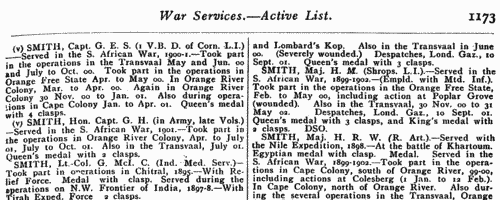
| Officers killed
(1916)
Lists of names of soldiers wounded, died of wounds, died, missing presumed dead, and taken prisoner by the enemy, were issued to the British national press under the title Roll of Honour. Each man is identified by surname, initials and number. The regimental returns from which the daily Roll was compiled were made up over the previous week or weeks. Each regimental return may be partial, covering only part of the alphabet. The lists are provisional, in that a man reported wounded one day may appear as died of wounds later; a missing presumed dead may later be reported as having been found, or as having died; the lists of prisoners of war were provided by the enemy and will relate to captures weeks earlier. However, these rolls are the most comprehensive single source of names of British and allied combatants meeting with misfortune in the Great War. This is the roll published 2 August 1916. NATION. Cost: £6.00.  | Sample scan, click to enlarge
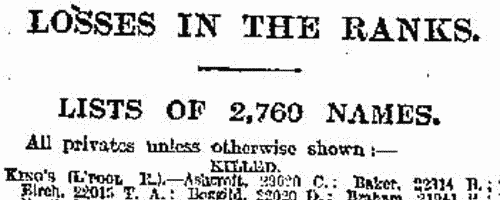
| Workers from James Booth & Co (1915) Ltd of Argyle Street, Nechells, Birmingham, who fought in the Great War
(1919)
The Roll of Honour for the firm lists the men who joined his Majesty's forces, giving for each his surname, initials, rank and regiment. NATION. Cost: £6.00.  | Sample scan, click to enlarge

| Boiler Makers and Iron and Steel Shipbuilders: Oldbury (1921)
The monthly report of the United Society of Boiler Makers and Iron and Steel Shipbuilders contains, as well as internal union business, reports of meetings; obituaries; warnings about named individuals falling into arrears, or becoming 'out of benefit'; members 'run out'; subscription sales; new members admitted; second class transferred to first class membership; apprentices admitted; apprentices transferred to adult membership; and 'unapproved' apprentices. Members are normally identified by surname and initial, with membership number as appropriate. These abbreviations also occur: 1st, first class; 2nd, second class; 3rd, third class; A.I.S., angle iron smith; App., apprentice; A.W., acetylene worker; C., caulker; D., driller; H-up, holder-up; P., plater; R., riveter; S.I.W., sheet iron worker. January 1921
NATION. Cost: £8.00.  | Sample scan, click to enlarge
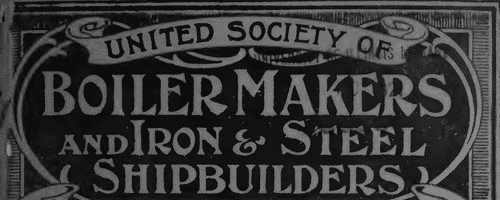
| Boys entering Sherborne School
(1929)
The grammar school at Sherborne in Dorset, which doubtless existed from the creation of the diocese of Sherborne in 705, was refounded by king Edward VI in 1550. At the quatercentenary in 1950, a fourth edition of the Sherborne Register was published, listing boys entering the school during those four centuries. In truth, the materials for this register survive but fitfully before 1823; for some years, no names are known; sometimes all that is known is a surname. But from 1823 onwards the lists and the details get steadily more comprehensive. By the 20th century the boys are listed alphabetically by surname under term of entrance. Surname is given in bold, then christian names, name of father (surname and initials) and address; year of birth; house (a, School House; b, Abbey House; c, The Green; d, Harper House (formerly The Retreat); f, Abbeylands; g, Lyon House; h, Westcott House); whether represented the school at cricket (xi), football (xv), shooting (viii), &c.; year of leaving; summary of degrees, career &c.; and (in italics), address as of 1950. Names in the early lists marked with an asterisk are found inscribed on the oak panelling or on the stone walls of the former schoolroom. (F) in the lists indicates a foundationer, receiving free education: after 1827, when this privilege was restricted to boys from Sherborne and neighbourhood, nearly all foundationers were day-boys.NATION. Cost: £4.00.  | Sample scan, click to enlarge
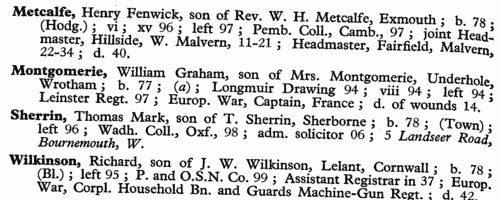
|
Research your ancestry, family history, genealogy and one-name study by direct access to original records and archives indexed by surname.
|













